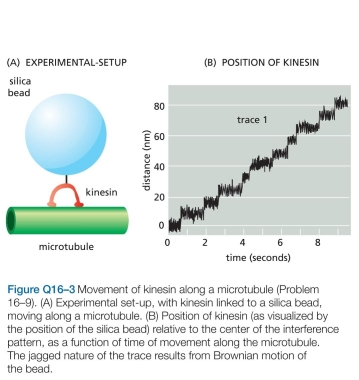
Molecular Biology Of The Cell 6th Edition by Bruce Alberts, Alexander Johnson, Julian Lewis, David Morgan, Martin Raff, Keith Roberts, Peter Walter
Edition 6ISBN: 978-0815345244
Molecular Biology Of The Cell 6th Edition by Bruce Alberts, Alexander Johnson, Julian Lewis, David Morgan, Martin Raff, Keith Roberts, Peter Walter
Edition 6ISBN: 978-0815345244 Exercise 9
How does a centrosome "know" when it has found the center of the cell?
A. As shown in Figure Q16-3B, all movement of kine- sin is in one direction (toward the plus end of the micro- tubule). What supplies the free energy needed to ensure a unidirectional movement along the microtubule? b. What is the average rate of movement of kinesin along the microtubule?
C. What is the length of each step that a kinesin takes as it moves along a microtubule?
D. From other studies it is known that kinesin has two globular domains that can each bind to tubulin, and that kinesin moves along a single protofilament in a microtu- bule. In each protofilament, the
tubulin, and that kinesin moves along a single protofilament in a microtu- bule. In each protofilament, the  tubulin subunit repeats at 8-nm intervals. Given the step length and the interval between
tubulin subunit repeats at 8-nm intervals. Given the step length and the interval between  tubulin subunits, how do you suppose a kine- sin molecule moves along a microtubule?
tubulin subunits, how do you suppose a kine- sin molecule moves along a microtubule?
E. Is there anything in the data in Figure Q16-3B that tells you how many ATP molecules are hydrolyzed per step?
A. As shown in Figure Q16-3B, all movement of kine- sin is in one direction (toward the plus end of the micro- tubule). What supplies the free energy needed to ensure a unidirectional movement along the microtubule? b. What is the average rate of movement of kinesin along the microtubule?
C. What is the length of each step that a kinesin takes as it moves along a microtubule?
D. From other studies it is known that kinesin has two globular domains that can each bind to
 tubulin, and that kinesin moves along a single protofilament in a microtu- bule. In each protofilament, the
tubulin, and that kinesin moves along a single protofilament in a microtu- bule. In each protofilament, the  tubulin subunit repeats at 8-nm intervals. Given the step length and the interval between
tubulin subunit repeats at 8-nm intervals. Given the step length and the interval between  tubulin subunits, how do you suppose a kine- sin molecule moves along a microtubule?
tubulin subunits, how do you suppose a kine- sin molecule moves along a microtubule? E. Is there anything in the data in Figure Q16-3B that tells you how many ATP molecules are hydrolyzed per step?

Explanation
Molecular Biology Of The Cell 6th Edition by Bruce Alberts, Alexander Johnson, Julian Lewis, David Morgan, Martin Raff, Keith Roberts, Peter Walter
Why don’t you like this exercise?
Other Minimum 8 character and maximum 255 character
Character 255


